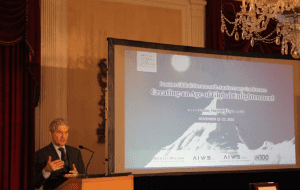Where AI will play an important role in governance, risk & compliance programs
September 4, 2023
Let speak about the broader contact of these multilateral gatherings and efforts like the Boston Global Forum and the Forum for Cooperation on AI that I co-lead at the Brookings Institution.
We are in a changing world. The international order that emerged from World War II and then the end of the Cold War no longer works. No one country or set of countries can operate alone, not the United States or United Nations or China. The problems we face are global – climate change, disinformation and misinformation, poverty and disease. Russia’s brutal invasion of Ukraine has changed the stakes.
These problems demand global solutions. Americans are familiar with what Benjamin Franklin said in another difficult time as members of the Continental Congress risked their lives in revolt against the British Crown: “We must all hang together, or we will hang separately.”
The White House National Security Council released a new national security strategy a month ago to address the development of a new national order, called “What Comes Next.” Its answer is “a new rules based order” that “builds on what came before.” The U.S. is willing to “partner with any nation” on two tracks:
I think framing this as a rules-based order makes sense. That makes it open to any regardless of its governance. We can cooperate with China on some issues, as we saw at COP27.
One of the important aspects of the U.S. strategy is that it elevates economic security on a par with strategic security. That’s something I worked toward when I was part of the Obama administration. It takes a page out of Shinzo Abe’s book. It is important in a digital era when a global digital economy works across sectors and regional or national lines.
In speaking about networks, I am reminded of what Robert F. Kennedy said in South Africa about how change comes. He spoke of “a million different centers of energy and daring” that create ripples, “and those ripples can build a mighty wave ….” Over time, ripples crossing fa network of networks can build a wave that forms a new international order.

AI World Society - Powered by BGF